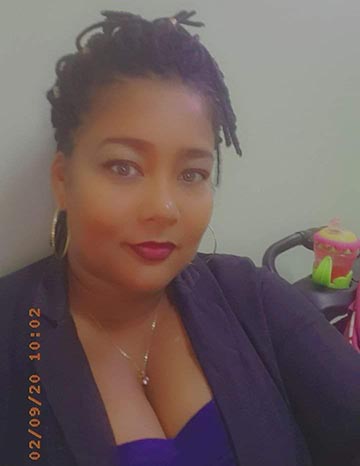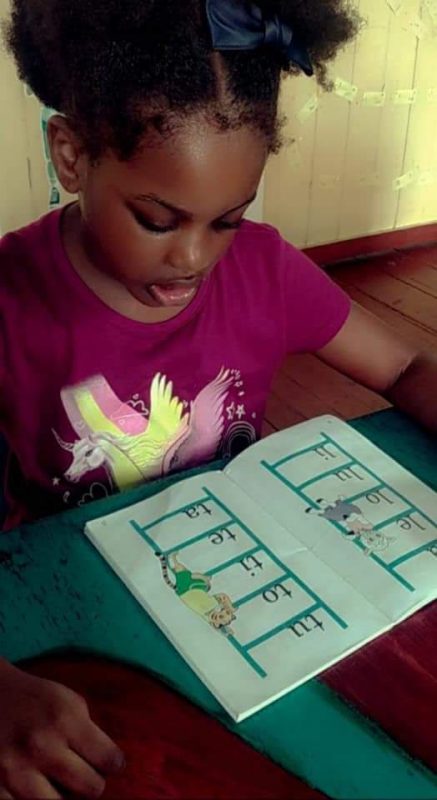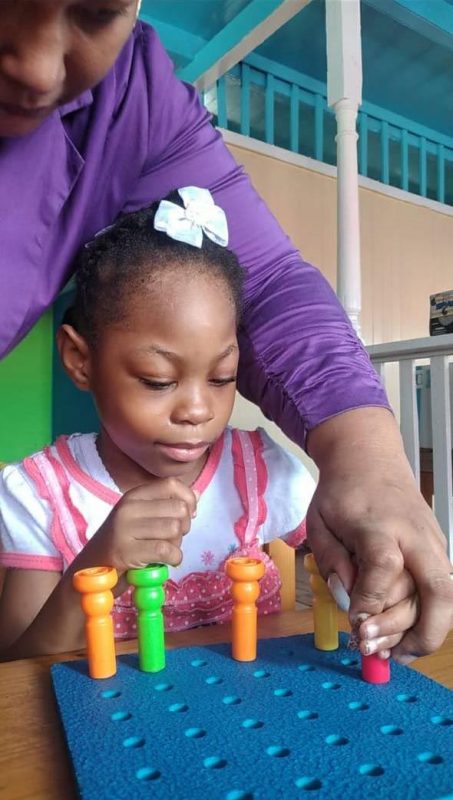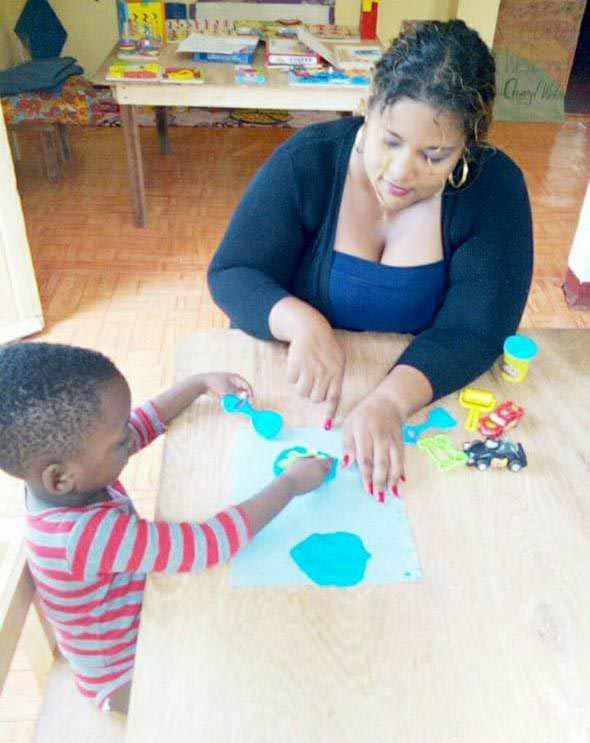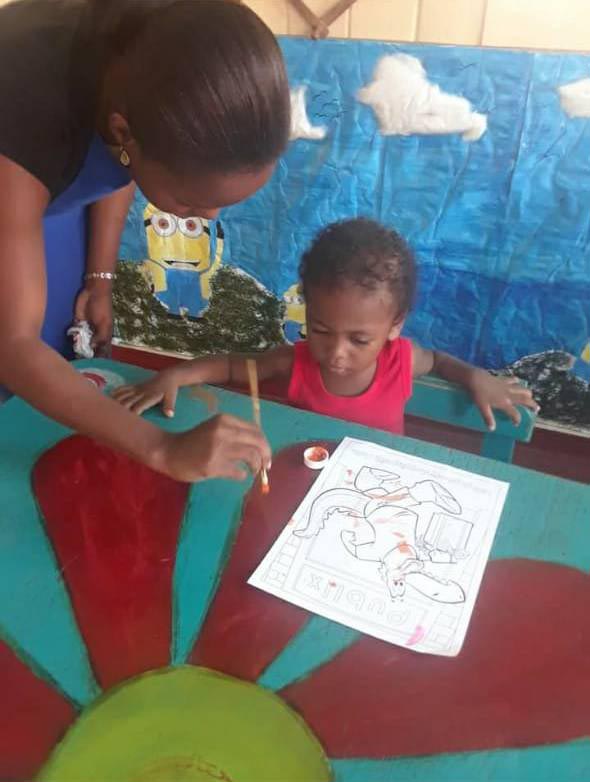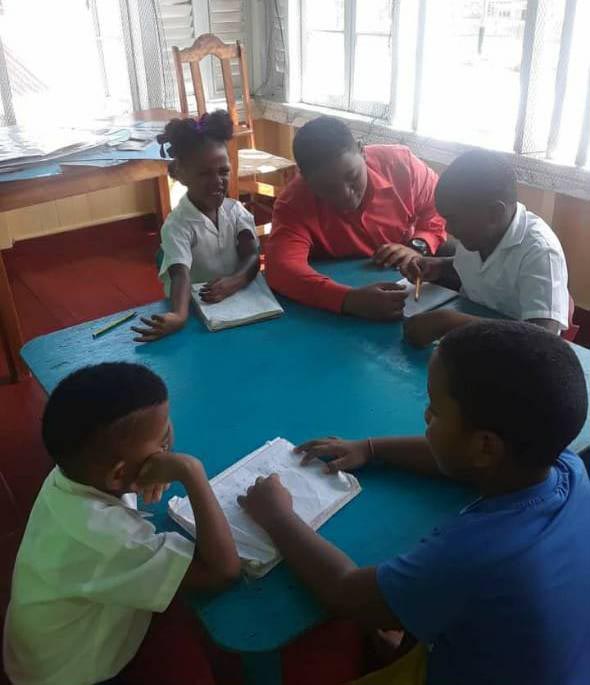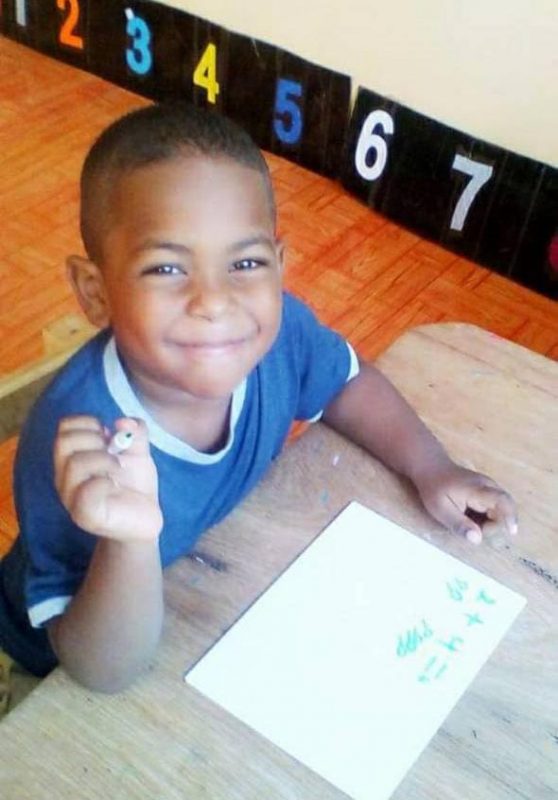Elizabeth Sue-Alert was doing a Zoom interview when she was interrupted by a timid child’s voice. “Repeat that again and go slowly, again. To the toilet? Okay straight at the back. Okay, paper? So we are going to pronounce it back. Paper. Excellent. Go to my office, look right on the printer, you can have a paper,” she said to the unseen child.
“Sorry about that. Have to attend whenever they come. I cannot just brush it off because I have to attend immediately,” she said, as she returned to the interview with a smile.
That exchange gave a window into a normal day for Sue-Alert, who manages and teaches at the MET Pride Academy for special needs children, which is located in Freeman Street, East La Penitence. MET stands for Multi Evaluation Team and Sue-Alert says her team takes pride in their work, hence the last part of the name.
While Sue-Alert’s days might be long, the almost six years she has been working with special needs children have seen her reevaluate her own life. She feels she is now living her purpose. When she landed what she thought at the time was a temporary job with a school that provided learning for children with autism, she believed it would have been for just a few weeks before she gained employment with a new start-up company.
Instead, she remained at the school for quite a while and was later motivated to start her own academy, which provides for children with different kinds of needs. The progress of her students is what gives her the motivation to continue even on her most difficult days. For instance, there is an 18-year-old student who could not write his name when he enrolled, but today not only knows how to write his name but is also involved in agriculture and earning for himself.
“What gives me great joy is to actually see the progress the children are making, just to see where they come from, what they could not have done and what they are doing today, that’s what gives you the joy,” Sue-Alert told Stabroek Weekend in an interview.
Love for children and love for individuals caused the former real estate agent to become passionate about teaching children with special needs, even though she said she was “never to be in this field”. She had landed a job as a manager of inventory for a new company, but then it paused its opening. As she waited on her new job, she decided to try teaching and has not looked back since.
“After I went and saw the children, I saw the work that they were doing and then I went home and realised I never knew of certain disabilities. I never knew about a lot of things… Within a week of working with them I told my husband this is what I want to do and I would decline the other job…,” the mother of three said.
Over the years, she has done numerous online courses and also understudied doctors as her journey progressed. Today she continues her studies and while there are tough days in terms of finances, Sue-Alert said she has found her niche.
Push them
Sue-Alert has been teaching children with special needs since 2014 and opened the doors of MET Pride in 2016. She said that from working at the other school she saw the ability of the children and knew if she could push them then they could do so much more with the needed assistance.
Her school caters for children with all disabilities, including Autism, Down syndrome, Rett syndrome, Dyslexia or Dyscalculia, Cerebral Palsy, and slow learners. She is the administrator as well as a therapist at the school as she is trained in occupational, speech and behavioural therapy.
If the child non-verbal, there is a special programme that the school purchases for $80,000, which is placed on a fifth generation Apple iPad and tailored for the individual child with their life’s routine inputted. No two children can use the same programme. The special iPad is purchased by the parent and after it is programmed the child takes it home as it is the child’s means of communication. They are taught to navigate each icon on the iPad and they will then use these to communicate in general during everyday life. Training is also offered for parents and for teachers and other individuals who are interested in certified training.
“So, we basically cater for all children that may have a challenge in learning. Additionally, to cater for their academics we also do therapy…with speech and they would also need occupational therapy which deals with the handwriting and fine motor skills and behavioural therapy as well,” Sue-Alert said.
The school is open Monday to Friday during normal school hours, but it does not have long holidays like regular schools as it only closes for three weeks or less. The short holidays are to ensure that the students do not regress as they already have challenges with learning and retaining and long periods of no teaching could set them back.
The school employs the applied behaviour analysis format of teaching combined with the Ministry of Education curriculum, which is tailored for each child’s individual needs. Each subject area is modified to suit a specific child and it is done in a one-on-one setting.
“So basically, in a nutshell, we just cater for how that child learns and not how we teach…,” she shared.
Sue-Alert did not touch on the cost for a child’s schooling as she indicated that this can only be done after the child is assessed and the parent interviewed as they first have to determine if the child needs the services provided by the school. If the child is enrolled, then the first week will entail continuous assessment and from the second week the programme for that child would be set. Data collection will be done every day for the child to ensure that all changes are tracked and if a change is not made during the term for the various tasks then the same will be repeated the next term but delivered differently.
The school accepts children from as early as two years old, even though she revealed that the youngest child enrolled is 18 months because he is doing speech therapy. Apart from academics, the school also teaches life skills and self-care programmes. The former teaches the child personal hygiene, including how to use the toilet and how to groom themselves as well as how to put on their shoes.
“The earlier we get them is better. So if we get a child from two then we have from two to ten to find out what are the child’s strong points, what he or she may like and allow them to choose what they want to do. Once we do that then we have from ten to the age of 16 to build on those skills where that child can be independent and where that child can also contribute back to society and where that child can even make a living for themselves,” Sue-Alert said.
For life skills, the school has a 21-year-old who is doing agriculture while the home economics department is being set up. According to the owner, whatever area the child shows an interest in, she has qualified persons come in and teach them the skill.
There is no cut-off age for admission as Sue-Alert pointed out that even though a student might be an adult chronologically, they are not their age and so while there is a starting point there is no cut off point. The only way a student will not be accepted is if the school is not for them, which means they cannot function. Currently the oldest student is a 21-year-old with dyslexia who passed through the regular school system without learning to write his name. He joined the school’s population at the age of 18 and it took him an entire year to learn to write his name. It was pointed out that it would have been better if he had enrolled earlier. His disability affects his memory, his writing and computational skills.
She gave an example of his communication when he told her, ‘Miss it is right here [pointing to his head] and I bring it forward and I tell you’, instead of saying, ‘I remember and now I can tell you’.
Some 14 students are currently enrolled but more can be accommodated as they have six teachers. The only way a child is asked to leave the school is if the parent does not work along with the school, especially in the area of their life skills. Corporal punishment is not administered at the school.
‘Lash everything off’
Sue-Alert spoke of a student who joined the school at three years old, who could not speak and all she did was “lash everything off of a table”. She could not feed herself, or go to the toilet on her own. But after one year, the child is now at a grade one level and can talk. Her first word was “no.”
“Her strong point is puzzles. She can look at a brand new puzzle and you can loose it up, and she would fit it back without making one mistake. That is her strong point. She also can carry on a conversation. She is six years old now and she knows from number one to 220 and when I say she knows it I can give her individual numbers and I can call out random numbers, and she can fix them,” Sue-Alert said.
She is also good at spelling, but Sue-Alert said she has to do things in order and as such there is a routine set.
There is also a 12-year-old boy who joined the school at age eight. He could not communicate and made his needs known by throwing tantrums. Now he knows some sign language, which he uses. He has the iPad and he uses this mainly to communicate his needs.
As for the 21-year-old student, who has indicated that he wants to financially assist his parents, Sue-Alert said he has a garden planted at the back of the school. Every morning before he enters the classroom, he waters the plants and cleans the garden. When he reaps, he sells the produce to parents as well as neighbours and takes the money home.
When COVID-19 hit Guyana, learning ceased for a while but she said with school being reopened it is one child per classroom. “…They work by sessions so no two children within a classroom…and that is how we work as of today,” she explained. One of the things the children need is social interaction, but now it can only be done with the teacher and the child.
The children regressed a lot academically during the period of closure, though they were able to receive therapy sessions. All teachers were paid during those months even though the fees for the children were slashed.
Sue-Alert said she is in a field where she belongs and answering the phone at any hour in the day or night to assist a parent who is having a struggle with a student is also part of what she does.
“I don’t have a problem with those calls because the parent is experiencing something that they don’t know how to handle and they need help…,” she said.
While she has received offers to go abroad and offer her service, she said there is a need for her in Guyana. There are plans to do outreaches in other regions as she said she receives calls from persons as far as Essequibo and she hopes to collaborate with others to provide the services. She hopes to have collaborations as well with private and public schools to train teachers in identifying children with special needs.
